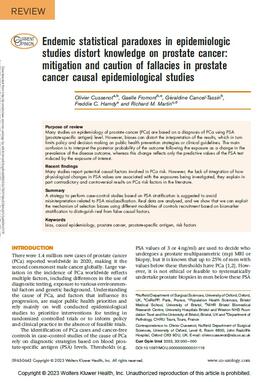
The SCOR Foundation has decided to support a project led by Olivier Cussenot, Professor of Urology and Director at the Center for Research on Prostatic and Urological Pathologies (CeRePP) in Paris: “Aligning competitive morbidities and causes of early onset deaths”.
The objective of this project is to integrate genetic markers into the estimation of competitive morbidity and mortality, in order to improve the risk assessment of early onset mortality resulting from age-related diseases. Ultimately, the idea is to pioneer innovative predictive models and pre-emptive healthcare strategies for the advancement of healthcare policies, with a strategic focus on prostate cancer. This condition is a subject of fierce debate in terms of screening and prevention, largely because of multifaceted comorbidities and intricate socio-cultural and environmental factors. The project is based on a robust transdisciplinary framework that incorporates the expertise of clinicians, geneticists, and mathematicians. As such, it serves as a conduit for collaboration between esteemed research structures and teams from the University of Paris-Cité, the University of Oxford, and CeRePP in Paris. Under the adept leadership of Professor Antoine Chambaz, Professor Freddie Hamdy, and project manager Professor Olivier Cussenot, the unique insights and skills of each team will foster a synergistic approach to the complexities of the research objectives.
The researchers recently published a comprehensive report shedding light on statistical paradoxes and fallacies prevalent in causal epidemiological studies of prostate cancer (Cussenot O, et al. Curr Opin Urol. 2023 PMID: 37555785). Their findings deciphered common errors attributable to confounding factors and misclassifications, revealing the critical significance of incorporating systems biology insights and implementing cross-validations with genetic markers in the realm of causal inference. This incorporation is instrumental in alleviating misclassifications and misconceptions within causal epidemiological studies.
The project draws upon an extensive dataset comprising millions of real-life data points, offering individual follow-ups spanning several decades, and leverages polygenic profiling. This data was collected through the French national health database and the PROGENE epidemio-genetic study, which CeRePP has spearheaded since 1995.
Anticipated outcomes will be categorized into three distinct levels using a range of cutting-edge statistical and artificial intelligence tools, including machine learning, boosting algorithms, and structural causal models. These methodologies will help to explore and formulate hypothetical future intervention strategies for prevention. With the support of the SCOR Foundation for Science, the project hopes to pave the way for transformative shifts in healthcare policy and the cultivation of precision preventive medicine, over and above the scope of prostate cancer assessment and prevention.
